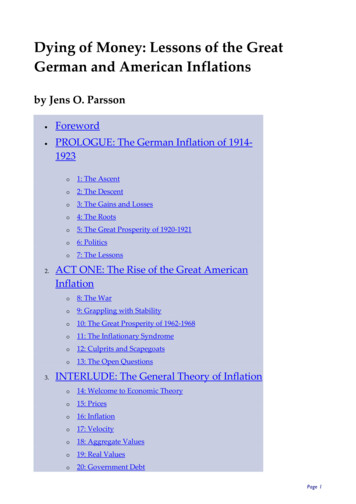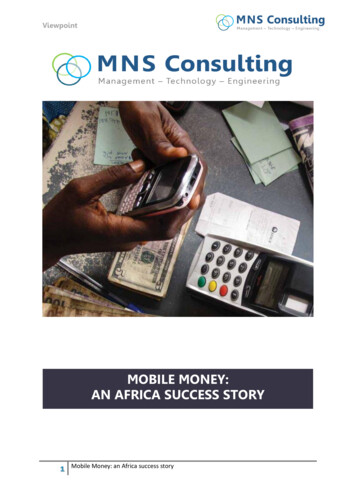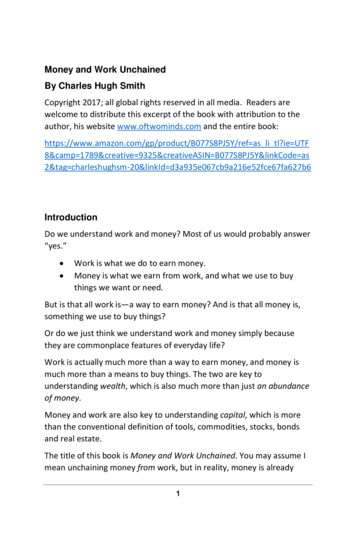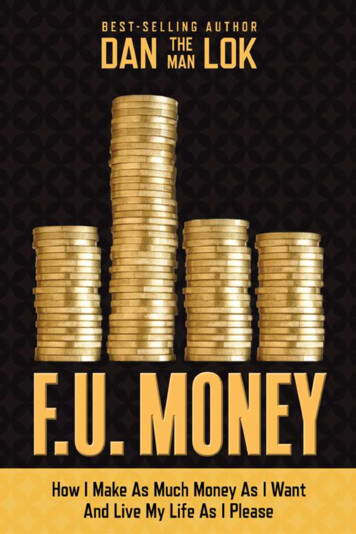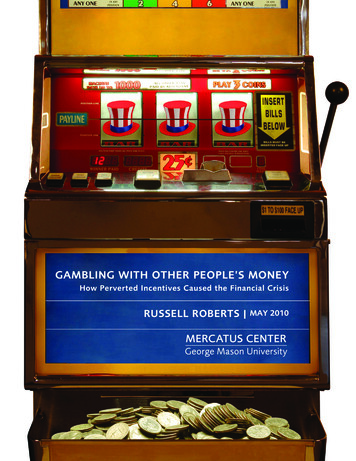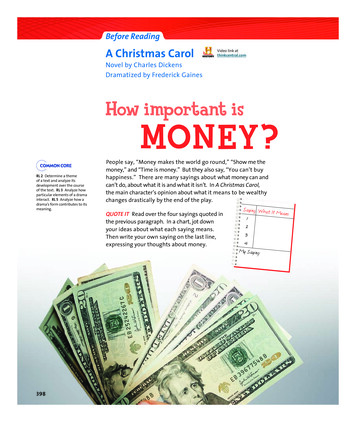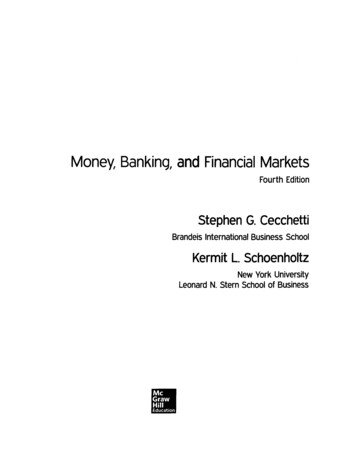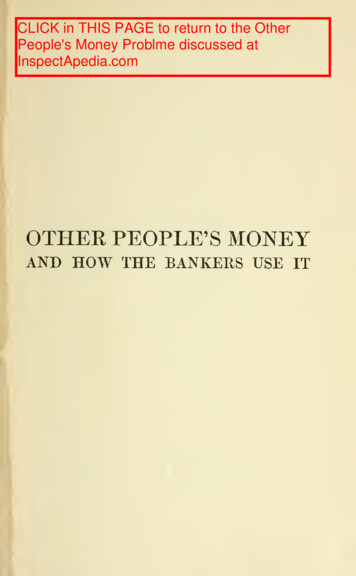
Transcription
CLICK in THIS PAGE to return to the OtherPeople's Money Problme discussed atInspectApedia.comOTHER PEOPLE'S MONEYAND HOW THE BANKERS USEIT
OTHER PEOPLE'S MONEYAND HOW THE BANKERS USEBYLOUIS D. BRANDELSNEW YORKFREDERICK A. STOKES COMPANYPUBLISHERSIT
Copyright, 1913, 1914, byThe McClure PubijcationsCopyright, 1914, byFrederick A. Stokes CompanyAll rights reservedH6-nMarch,19H
PREFACEWhile Louis D. Brandeis's series of articleson the money trust was running in Harper'sWeekly many inquiries came about publicationEven within more accessible permanent form.out such urgence through the mail, however,would have beenitclear that these articles inevit-ably constituted a book, since they embodied ananalysisand a narrative by that mind which, onthe great industrialmovementsof our era, is themost expert in the United States.Theinquiriesmeant that the attentive public recognized thathere was a contribution to history. Here was theclearest and most profound treatment everpublished on that part of our business develop-ment which,as President Wilsonmen have said,and other wisehas come to constitute the greatestof our problems.Thestory of industry.Nostory of our timeisthescholar of the future willbe able to describe our era with authority unlesshe comprehends that expansion and concentrationwhich followed the harnessing of steam and electricity,the great uses of the change, and the great
PREFACEviexcesses.No historianion, will findof the future, inwhyso masterful an analysis ofwentastray.myopin-among our contemporary documentsamIconcentrationbut one amongmany wholook upon jMr. Brandeis as having, in thefield ofeconomics, the most inventive and sound mindof our time.WhileHarper's Weeklyhis articleswere running inhad ample opportunity toknow how widespread was the belief amongintelligentourmoneymentrustIthat this brilliant diagnosis ofwas the most importantbution to current thought inmanycontri-years."Great" is one of the words that I do not useand I look upon Mr. Brandeis as a greatman. In the composition of his intellect, oneof the most important elements is his comprehension of figures. As one of the leading financiers of the country said to me, "Mr. Brandeis'sloosely,greatness as a lawyera mathematician."isMypart of his greatness asviews on this subjectare sufficiently indicated in the following editorial inHarper's Weekly.ARITHMETICAbout five years before tlic Metropolitan TractionCompunj' of New York went into tlie hands of a receiver,Mr. Bnindeis came down from lioston, and in a speech atCooper Union prophesied that that company must fail,
PREFACEviiNew York and Boston were heartilyrecommending the stock to their customers. Mr. Brandeismade his prophecy merely by analyzing the publishedLeading bankers inHowdid he win in the Pinchot-Glavis-BallingerIn various ways, no doubt; but perhaps themost critical step was when he calculated just how long itwould take a fast worker to go through the Glavis-Ballingerfigures.controversy?make a judgmentrecord andofwhereupon he decidedit;that Mr. Wickersham could not havethe timeitmadehis report atwas stated to have been made, and thereforeitmust have been predated.Most of Mr. Brandeis's other contributions to currenthistory have involved arithmetic.preventing a raise in freight rates,analysis of cost.Whenstarted in Massachusetts,Whenithe succeeded inwas through an exacthe got Savings Bank Insurancewas by being able to figure whatitWhen he made the best contractbetween a city and a public utility that exists in this country,a definite grasp of the gas business was necessary combined, of course, with the wisdom and originality that makea statesman. He could not have invented the preferentialshop if that new idea had not been founded on a preciseknowledge of the conditions in the garment trades. Whenhe established before the United States Supreme Court theconstitutionality of legislation affecting women only, herelied much less upon reason than upon the amount of knowledge displayed of what actually happens to women whenthey are overworked which, while not arithmetic, is builton the same intellectual quality. Nearly two years beforeMr. Mellen resigned from the New Haven Railroad, Mr.Brandeis wrote to the present editor of this paper a privateletter in which he said:"When the New Haven reduces its dividends and Mellenresigns, the Decline of New Haven and Fall of Mellen' willinsurance ought to cost.——'
PREFACEviiimakea dramatic story of— including thetwohumaninterest with a moralevils of privatemonopoly.not be long deferred, and possibly you—orEvents can-may wantto preparefor their coming."Anticipating the future alittle, Isuggest the followingas an epitaph or obituary notice:"Mellen was a masterful man, resourceful, courageous,He fired the imagination of New England;but, being obUque of vision, merely distorted its judgmentand silenced its conscience. For a while he trampled withimpunity on laws human and divine; but, as he was obsessedwith the delusion that two and two make five, he fell, atlast, a victim to the relentless rules of humble arithmetic.broad of view.'"Remember, O Stranger, Arithmeticand the mother of safety.'"isthefirst ofthesciencesThe exposure of the bad jBnancial managementof the New Haven raikoad, more than anyother one thing, led to the exposure and com-prehension of the wasteful methods of big businesstheallover the country and that exposure ofNew Haven wasthe almost single-handedMr. Brandeis. He is a person whofights against any odds while it is necessaryto fight and stops fighting as soon as the fightis won.For a long time very respectable andworkofhonest leaders of finance said that his chargesagainst theexcusable.New Haven were unsound andHe kept ahead. A year beforein-theactual crash came, however, he ceased worrying,forhe knew the work had been carried far enough
PREFACEto completeitself.to take part inWhen someonesomelittleixasked himcontroversy shortlybefore the collapse, he replied, ''That fight doesme any longer. Time and arithmeticdo the rest."This grasp of the concrete is combined in Mr.Brandeis with an equally distinguished grasp ofbearing and significance. His imagination is asnot needwillnotable as his understanding of business.those accomplishments which have givenplace in Americanlife,Inhim hismindthe two sides of hishave worked together. The arrangement between the Gas Company and the City of Bostonrests on one of the guiding principles of Mr.Brandeis' s life, that no contract is good that isnot advantageous to both parties to it. Behindhis understanding of the methods of obtaininginsurance and the proper cost of it to the laboringman lay a philosophy of the vast advantage tothe fibre and energy of the community that wouldcome from devising methods by which the laboring classes couldmake themselves comfortablethrough their wholelivesand thus perhaps mak-ing unnecessary elaborate systems of state help.The most important ideas put forth in theArmstrong Committee Report on insurance hadbeen previously suggested by Mr. Brandeis,
uitablepolicymore importantthestatesmanship were intimately combined in theProtocol in New York,which has done so much to improve condi-managementtionsintheof the laborerseems to]\Ir.oftheclothingandindustry.Thehis relation to hisBrandeis,asitwelfareemployerdoes toallthemost competent thinkers today, to constitutethe most important question we have to solve,and he won the case, coming up to the SupremeCourt of the United States, from Oregon, establishing the constitutionality of special protectivelegislation forcase,alsowomen.In the IMinimumfrom the Stateof Oregon,Wagewhichisabout to be heard before the Supreme Court, hetakesup what is really a logical sequence of thewomen's hours in certain industries,limitation ofwould be a futile performance to limitand then allow their wages to be cutdown in consequence. These industrial activitiesare in large part an expression of liis deep andever growing sympathy with the working peopleand understanding of them. Florence Kelleysinceittheir hours"No man since Lincoln has understoodcommon people as Louis Brandies does."once said:the
PREFACExiMr. Brandeis's greatprogressive achievements have been connectedwith the industrial system, some have been politI worked with himical in a more limited sense.through the Ballinger-Pinchot controversy, andI never saw a grasp of detail more brilliantlycombined with high constructive ethical andWhile the majoritypoliticalthinking.ofAftertheman who knewmost about the details of the Interior Department had been cross-examined by Mr. Brandeishe came and sat down by me and said: "Mr.Hapgood, I have no respect for you. I do notthink your motives in this agitation are goodmotives, but I want to say that you have awonderful lawyer. He knows as much aboutthe Interior Department today as I do." Inthat controversy, the power of the administration and of the ruling forces in the House andSenate were combined to protect SecretaryBallinger and prevent the truth from comingto light.Mr. Brandeis, in leading the fight orthe conservation side, was constantly hauntedby the idea that there was a mystery somewhere.The editorial printed above hints at how hosolved the mystery, but it would require muchmore space to tell the other sides, the enthusiasm for conservation, the convincing arguments
dards inthethe connectioncountry's largerSeldom is an audience at a hearing somoved as it was by Mr. Brandeis's final plea toneeds.the committee.Possibly his work on railroads will turn out to bethe most significantamongBrandeis has done.thebeforethemanyMr.thingsHis arguments in 1910-11InterstateCommerce Commissionagainst the raising of rates, on the ground thatthewayto beidea.for railroads tomoreItisefficient,be more prosperous wasmadeefficiency a nationala cardinal point in his philosophythat the only real progress toward a higher nationallife willcome throughefficiency in all ourThe seventy-eight questions addressedby the Interstate CommerceCommission in December, 1913, embody whatactivities.to the railroadsisprobably the most comprehensive embodimentof his thoughtOnon the subject.nothing has he ever worked harder than onMoney Trust, and when hiscomes to be written (I hope many years hence)this will be ranked with his railroad work forhis diagnosis of thelifeits effect inisaccelerating industrial changes.indeed more than a coincidence that soof the things he hasbeen contendingforItmanyhave
PREFACEcomeoneto pass.idea,It isseldom that onenot to saybefore the world, butthat Mr. Brandeisisxiiimanyit isideas,manputseffectivelyno exaggeration to sayresponsible for thenow wide-spread recognition of the inherent weakness ofgreatsize.He wasthefirstpersoneffectively the doctrine that thereiswhoset fortha limit to thesize of greatest efficiency,and the successful demon-stration of that truthisa profound contribu-The demonstrationtion to the subject of trusts.ispowerfully put in his testimony before theSenate Committee in 1911, and it is powerfullyput in this volume. In destroying the delusionthat efficiency was acommonemphasized the possibilityincident ofof efficiencysize,hethroughintensive development of the individual,thusconnecting this principle with his whole study ofefficiency,and pointing the wayto industrialdemocracy.Notlessnotable than the intellect and theconstructive abilitythat have gone into Mr.Brandeis' s work are the exceptional moral qualities.mustAnypowerful and entirely sincere crusadermuch. Mr. Brandeis has sacrificedmuch in money, in agreeableness of social life,in effort, and he has done it for principle and forhuman happiness. His power of intensive work,sacrifice
PREFACExivhis sustained interestandwill,andhis couragehave been necessary for leadership. No mancould have done what he has done withoutbeing willing to devote his life to making hisdreams come true.Nor should anyone make the mistake, becausethe labors of Mr. Brandeis and others have recently brought about changes, that the systemwhich was being attacked has been undermined.The currency bill has been passed, and as thesewords are written, it looks as if a group of trustBut systems are notbills would be passed.ended in a day. Of the truths which are embodied in the essays printed in this book, some arebeing carried out now, but it will be many, manyyears before the whole idea can be made effective;and there will, therefore, be many, many yearsduring which active citizens will be struggling forthose principles which are here so clearly, soeloquently, so conclusively set forth.Thebeforearticles reprintedNovember,1913.Management" appearedAug.IG, 1913; the22, 1913here were"TheinallwrittenFailure of BankerWeeklybetween Nov.Harper'sother articles,and Dec. 17, 1914.Norman Hapgood.March, 1914.
CONTENTSPAGECHAPTERIIIIIIOur Financial OligarchyHow1THE Combiners Combine28Interlocking Directorates51IV Serve One Master Only!69V What Publicity Can DoVI Where the Banker is Superfluous92VII BigVIIIMen andA CurseLittle Business.109.135of BignessIX The Failure of Banker- managementX The Inefficiency of the OligarchsXV162.189201
OTHER PEOPLE'S MONEYAND HOW THE BANKERS USECHAPTERITIOUR FINANCIAL OLIGARCHYPresident Wilson, when Governor, declaredin 1911:"The great monopoly inmoney monopoly. So longthiscountryistheas that exists, ourand freedom and individual energy ofdevelopment are out of the question. A greatindustrial nation is controlled by its system ofcredit.Our system of credit is concentrated.The growth of the nation, therefore, and all ouractivities are in the hands of a few men, who,even if their actions be honest and intended forold varietythe public interest, are necessarily concentratedupon the great undertakings in which their ownmoney is involved and who, necessarily, by everyreason of their own limitations, chill and checkand destroy genuine economic freedom. Thisis the greatest question of all; and to this, states-
—:OTHER PEOPLE'S MONEY2men mustaddress themselves with an earnestdetermination to serve the long future and thetrue hberties of men."—appointedThe Pujo Committee1912infound"Far more dangerous thanpened to usof competition in industryallthat has hap-wayin the past in theofehminationthe control of creditisthrough the domination of these groups over ourbanks and industries.""Whether under a different currency systemthe resources in our banks would be greater or.less istition.comparatively immaterialto be controlled"It.isifthey continueby a small group.".impossible that there should be compe-withallthefacilities for raisingbondsmoneyorhands of thesefew bankers and their partners and allies, whotogether dominate the financial policies of mostselling large issues ofof the existing systems.in the.Theacts of thisinner group, as here described, have neverthelessbeen more destructivething accomplishedofcompetition than any-by thetrusts, forthey strikeat the very vitals of potential competition inevery industry thatcondition whichifisunder their protection, apermitted to continue, will
OUR FINANCIAL OLIGARCHYrender impossibleallattempts to restore nor-mal competitive conditionsworld.inthe industrial."If the arteries of creditto choking3nowclogged well-nighby the obstructions created throughthe control of these groups are opened so that theymaybe permitted freely to play their importantpart in the financial system, competition in largebecome possible and business canbe conducted on its merits instead of being subject to the tribute and the good will of this handenterprises willfulof self-constitutedtrustees of the nationalprosperity."The promiseofNew Freedom wasjoyouslyproclaimed in 1913.which the Pujo Investigating Committee and its able Counsel, Mr. Samuel Untermyer, have laid before the country, show clearlythe means by which a few men control the busiThe report proposes measness of America.ures which promise some relief. Additional remeCongress will soon bedies will be proposed.ThecalledfactsuponHowwhatto act.shall thelines shallemancipation be wrought?we proceed?fully understood, will teach us.Thefacts,Onwhen
OTHER PEOPLE'S MONEY4THE DOMINANT ELEMENTThe dominant element in our financialgarchythe investment banker.isbanks, trust companies andlifeoli-Associatedinsurance com-Controlled railroads, publicpanies are his tools.serviceandjects.Though properly but middlemen,industrial corporations are his sub-thesebankers bestride as masters America's businessworld, so that practically no large enterprise canbe undertaken successfully without their participationorcourse,ableapproval.menThese bankersare,ofpossessed of large fortunes;but the most potent factor in their control ofbusinessisnot the possession of extraordinaryhuge wealth. The key to their power isCombination concentration intensive and comprehensive advancing on three distinct lines:First: There is the obvious consolidation ofbanks and trust companies; the less obviousafhliationsthrough stockholdings, voting trustsand interlocking directorates of banking instiability or———tutions—which are notlegallyconnected; andthe joint transactions, gentlemen's agreements,and "banking ethics" which eliminate competitionamongthe investment bankers.Second: Thereintoisthe consolidation of railroadshuge systems, the large combinations of
OUR FINANCIAL OLIGARCHY5public service corporations and the formation ofindustrial trusts, which,"big" thatlocal,by making businessessoindependent banking concernscannot alone supply the necessary funds, hascreated dependence upon theYork bankers.But combination, howeverNewassociatedintensive,alongthese lines only, could not have produced theMoneyTrust—anotherof combinationand more potent factorwas added.Third: Investment bankers, like&Co., dealers in bonds, stocksP.J.andMorgannotes, en-croached upon the functions of the three otherwhich their businessbrought them into contact. They became thedirecting power in railroads, public service andindustrial companies through which our greatbusiness operations are conducted the makersThey became the directingof bonds and stocks.power in the life insurance companies, and otherclasses of corporations with—corporate reservoirs of the people's savingsbuyers of bonds and stocks.directingpoweralso in—theThey becamethebanks and trust companies—the depositaries the quick capital the country— theblood of business, with which theyofoflifeand others carried ontheir operations.Thusfour distinct functions, each essential to business.
:OTHER PEOPLE'S MONEY6and each exercised, originall}", by a distinct set ofmen, became united in the investment banker.It is to thisunion of business functions that theexistence of theMoneyThe developmentTrustismainly due.*our financial oligarchyoffollowed, in this respect, lines withwhich thehistory of political despotism has familiarized us—usurpation,proceeding by gradual encroach-ment rather than byoftenlong-concealedviolent acts; subtleconcentrationofanddistinctwhich are beneficent when separatelywhen combinedIt was by processes suchin the same persons.as these that Caisar Augustus became master ofRome. The makers of our own Constitutionhad in mind Uke dangers to our political libertyfunctions,administered, and dangerous onl}"when they providedofso carefully for the separationgovernmental powers.THE PROPER SPHERE OF THE INVESTMENTBANKERTheoriginal function of the investmentwas thatof dealer in bonds, stocksbankerand notes;buying mainly at wholesale from corporations,only a few of (ho invest nicrit bimkors oxorpower; but many othors i)erf(jrin important functhe eystem, as hereinafter described.*ObviousIj'risc this Krcattions in
OUR FINANCIAL OLIGARCHYmuDicipalities,states7and governments whichneed money, and selHng to those seeking investments.The bankerperforms, in this respect, thefunction of a merchant; and the functionvery useful one.isaLarge business enterprises areconducted generally by corporations.Theper-manent capital of corporations is represented bybonds and stocks. The bonds and stocks of themore important corporations are owned, in largepart, by small investors, who do not participatein the management of the company.Corporationsforrequirethe aidof abanker-middleman,they lack generally the reputation andclien-own bonds andstockstele essential to selling theirdirect to the investor.Investors in corporatesecurities, also, require the services ofa banker-middleman. The number of securities upon themarket is very large. Only a part of these securities is listed on the New York Stock Exchange; but its listings alone comprise aboutsixteen hundred different issues aggregatingabout 26,500,000,000, and each year new listings are made averaging about two hundredand thu-ty-three to an amount of 1,500,000,000.For a small investor to make an intelligent selection from these many corporate securities indeed, to pass an intelligent judgment upon a—
—OTHER PEOPLE'S MONEY8—single oneabilit}',theisordinarily impossible.facilities,essential to a properpurchaseisHe lacks thethe training and the timeinvestigation.Unless histo be little better than a gamble, heneeds the advice of an expert, who, combiningknowledge with judgment, has the faciland incentive to make a thorough investigaThis dependence, both of corporations andtion.of investors, upon the banker has grown in recentyears, since women and others who do not participate in the management, have become theowners of so large a part of the stocks and bondsof our great corporations.Over half of thestockholders of the American Sugar RefiningCompany and nearly half of the stockholders ofthe Pennsylvania RaUroad and of the New York,New Haven & Hartford Railroad are women.specialities—Good- will the possession by a dealer of numerous and valuable regular customers is alwaysan important element in merchandising. But inthe business of selling bonds and stocks, it is of—exceptional value, for the very reason that thesmall investor relics so largely upon the banker'sjudgment.Thisconfidentialbanker to customersrelationofthe— and the knowledge of thecustomers' private afTairs acquired incidentally
OUR FINANCIAL OLIGARCHYis9often a determining factor in the marketing ofWith the advent of Big Businesssuch good-will possessed by the older bankinghouses, preeminently J. P. Morgan & Co. andtheir Philadelphia House called Drexel & Co.,by Lee, Higginson & Co. and Kidder, Peabody,& Co. of Boston, and by Kuhn, Loeb & Co. ofNew York, became of enhanced importance.The volume of new security issues was greatlyincreased by huge railroad consolidations, thedevelopment of the holding companies, and particularly by the formation of industrial trusts.The rapidly accumulating savings of our peoplesought investment. The field of operations forsecurities.the dealer in securities was thusAnd, as thesecuritiesmuchenlarged.were new and untried, thebanker were in greatpowers and profits increasedservices of the investmentdemand, andhisaccordingly.CONTROLLING THE SECURITY MAKERSButthisenlargement of their legitimatefieldof operations did not satisfy investment bankers.They were not content merely to deal in securities.They desired to manufacture them also. Theybecame promoters, or allied themselves withThus it was that J. P. Morgan fepromoters.
OTHER PEOPLE'S MONEY10Company formedthe Steel Trust, the HarvesterTrust and the Shipping Trust.And, adding theduties of undertaker to those of midwife, theinvestment bankers became, in times of corporatemembers of security-holders' "ProCommittees"; then they participated asdisaster,tective"Reorganization Managers" in the reincarnationof the unsuccessful corporationsand ultimatelywaybecamedirectors.Morganassociates acquired their holdItSouthern Railway,Reading,the Erie,wasthethein thisNorthernthat theupon thePacific,thePere Marquette, theChicago and Great Western, and the Cincinnati,Hamilton & Dayton. Often they insured thecontinuance of such control by the device of thevoting trust; but even where no voting trust wascreated, a secure hold was acquired upon reorganization.It was in this way also that Kuhn,Loeb & Co. became potent in the Union Pacificand in the Baltimore & Ohio.But the banker's participation in the management of corporations was not limited to casesof promotion or reorganization.An urgent orextensive need of new money was considered anker'senteringaOften without even suchinvestment banker has secured a
OUR FINANCIAL OLIGARCHYplaceupon the Boardof Directors,11through hispowerful influence or the control of his customers'proxies.trance ofSuch seems to have been the fatal enMr. Morgan into the management ofthe then prosperousNewHartford Railroad, inbanker has entered theNew Haven &1892.When once aBoard— whatever mayYork,—have been the occasion his grip proves tenaand his influence usually supreme; for hecontrols the supply of new money.ciousThe investment bankerisnaturally on thelookout for good bargains in bonds and stocks.Likeotherhe wants to buyBut when he becomesmerchants,merchandise cheap.hisdi-rector of a corporation, he occupies a positionwhich prevents the transaction by which heacquires its corporate securities from beingproperly called a bargain.bargaining where the sameCanmanthere be realon both sidesof a trade?The investment banker, through hiscontrolling influence on the Board of Directors,decides that the corporation shall issue and sellthe securities, decides the price at which it shallsell them, and decides that it shall sell thesecurities to himself.Theisfact that there areother directors besides the banker on the Board
OTHER PEOPLE'S MONEY12does not, in practice, prevent this being the result.The banker, whoholds the purse-strings, becomesusually the dominantspirit.Through voting-trusteeships, exclusive financial agencies,mem-bership on executive or finance committees, ormeredirectorships, J. P.Morgan &associates, held such financialCo.,powerandbytheirin at leastthirty-two transportation systems, public utility—and industrial companies companies with an aggregate capitalization of S17,corporations273,000,000.trolled, J. P.IMainly for corporations so con-Morgan & Co. procured thepublicmarketing in ten years of security issues aggregating 1,950,000 ,000. This huge sum does notany issues marketed privately, nor anymai'keted, of intra-state corhoweverissues,Kuhn, Loeb & Co. and a few otherporations.includeinvestment bankers exercise similar control overmanyother corporations.CONTROLLING SECURITY BUYERSSuch controlof railroads, public serviceandindustrial corporations assures to the investmentbankers an ample supply of securities at attract-and merchandise well bought is halfBut these bond and stock merchants areive prices;sold.not disposed to take even a slight risk as to their
OUR FINANCIAL OLIGARCHYability tomarkettheir goods.They saw13thatifthey could control the security-buyers, as well asthe security-makers, investment banking would,"a happy hunting ground"; and theyhave made it so.The numerous small investors cannot, in thestrict sense, be controlled; but their dependenceupon the banker insures their being duly influenced.A large part, however, of all bondsissued and of many stocks are bought by theprominent corporate investors; and most promiindeed, benent among these are the life insurance companies,The purchasethe trust companies, and the banks.of a securityby theseinstitutions not only relievesrecommendsthe banker of the merchandise, butitstrongly to the small investor,whobelievesthat these institutions are wisely managed. Thesecontrolled corporate investors are not only largecustomers, butdating ones.maybe particularly accommo-Individualinvestors areThey buy only when they wantaretodomoody.so.Theysometimes inconveniently reluctant.porate investors,ifcontrolled,mayCor-be made tobuy when the bankers need a market.Itwasnatural that the investment bankers proceeded toget control of the greatlifeinsurance companies,as well as of the trust companiesand the banks.
OTHER PEOPLE'S MONEY14The field thus occupied is uncommonly rich.The life insurance companies are our leadingTheir huge surplus andinstitutions for savings.reserves,augmenteddaily, arealways clamoringNopanic or money shortagenew money from the perennialstream of premiums on existing policies and interest on existing investments.The three greatcompanies the New York Life, the Mutual offor investment.stops the inflow of—New—would have overYork, and the Equitable 55,000,000 of newmoneyto invest annually,even if they did not issue a single new policy.In 1904 just before the Armstrong investigation——these three companies had together 1,247,They had331,738.18 of assets.issued in thatyear 1,025,671,126 of new poUcies.The NewYork legislature placed in 1906 certain restrictionsupon their growth; so that their new businesssince has averaged 547,384,212, or only fifty-three per cent, of whatitwasBut thein 1904.aggregate assets of these companies increased inthe last eight years to 1,817,052,260.36.At thetime of the Armstrong investigation the averageage of thesetlireecompanies wasThe growth of assets infifty-six years.the last eight yearswas abouthalf as large as the total growth in the precedingfifty-sixyears.Thesethreecompaniesmust
OUR FINANCIAL OLIGARCHYinvest annually about 70,000,000 of15new money;and besides, many old investments expire or arechanged and the proceeds must be reinvested. Alarge part of all life insurance surplus and reserves are investedbondinbonds.The aggregateinvestments of these three companies onJanuary 1, 1913, was 1,019,153,268.93.It was natural that the investment bankersshould seek to control these never-failing reservoirs of capital.George W. Perkins was Vice-President of theNew Yorkthe companies.While remaining such he wasmade apartner inJ. P.Life,the largest ofMorgan &Co.,andinthe four years preceding the Armstrong investi-New
other. people's. money. and. how. the. bankers. use. it. by. louis. d. bran
